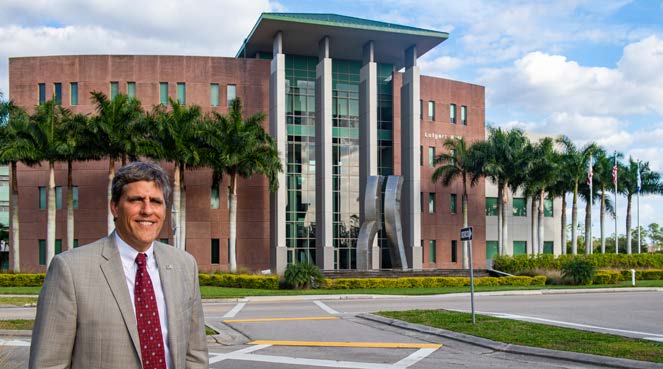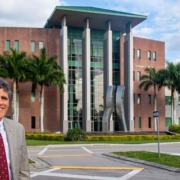Academic on Pandemic: NHS Grad is Now FGCU Dean

by Jeff Lytle
A Naples High School graduate has become a leading voice for public policy and economic recovery amid the pandemic. Chris Westley, the new dean of the Lutgert College of Business at Florida Gulf Coast University, has embraced the community’s need for thoughtful analysis and helping businesses regain consumer confidence.
Westley, a prolific published writer in the global field of economics, holds a doctorate from Auburn University. He graciously made time to answer my fundamentalquestions.
1. What have we learned from a business and economic perspective about America’s pandemic experience?
It made me think of inflation as a moral hazard of sorts. Meaning, there are increased incentives on the part of those in power to impose policies they know will cause widespread economic and social harm if they think the central bank will always create money out of thin air to address that harm. In this case, it would mean that if economists estimate lockdowns or shuttering nonessential industries will cause $X trillion in damage, the government can simply respond with a spending bill of $X trillion, the Fed will monetize it, and everything will be okay.
These incentives couldn’t exist when the dollar was tied to gold, even loosely, like it was in 1969, and the Hong Kong Flu killed over 1 million people worldwide.

Chris Westley
2. What have we learned from a business and economic perspective about Southwest Florida’s pandemic experience?.
I’d say we learned three things. First, that diversified economies are better able to deal with pandemics. Second, that our economy is largely dependent on consumer confidence in other states. And third, that policies imposed on business in the name of public health cripple small, mom-and-pop businesses (which account for 70 percent of all employment), while favoring the large, the cartelized, and the big box firms, which have thrived.
3. I thought the 2008 recession taught a lot about entities being connected; i.e., real estate and furniture sales. The pandemic seems to take connectivity to a whole new level, affecting everything and everyone, even non-profits.
The fact that we are so interconnected is a big reason why we are so wealthy as a society. Wealth creation is maximized when the division of labor is extended to the furthest level possible. These interconnections form the basis of civilization itself. The fact that you write well and are paid for it, and the fact that your plumber is well trained and is paid well for it, means that you specialize and depend on each other and want each other to do well.
That public health policy caused large swaths of the workforce to shut down really upset these relationships and reminded us of how important they were.
4. The pandemic is already changing the way some new homes are designed, with more offices and larger living rooms, for example. Do you see that?
The pandemic has shown many businesses that they can be just as productive with less travel and less office space. In the long run, this will benefit consumers because businesses will require lower prices to cover their costs. Commercial real estate will never be the same, although businesses requiring creative output will always require face-to-face workplaces.
5. How does the pandemic change providing and getting a college education?
Many of the changes we’ve seen to teach remotely will be mainstreamed. But not all disciplines are conducive to those kinds of teaching approaches. At the end of the day, the market demands that a college degree signifies the ability to read, write, think critically, adapt, and change over the course of one’s career, and these skills are not always confirmed when distance learning or online education is the primary mode of college education.
Students will still need to be evaluated in classroom settings by their professors, and professors will still have to look students in the eyes to ensure their students are mastering their disciplines.
6. Can the local health care industry survive and thrive?
It will always survive because the demand for health care will always exist. But for it to thrive it must be more subject to market forces, and a lot of improvement in that direction needs to be done. For instance, there was clearly an increased demand for hospital beds in 2020 but very little talk of building new hospitals because regulatory burdens, such as certificate-of-need requirements, effectively squelched any response to that demand.
FGCU’s recent efforts to create an Aging Health Care Professional Credential is an example of higher education nudging the industry to respond to an emerging market demand.




Leave a Reply
Want to join the discussion?Feel free to contribute!